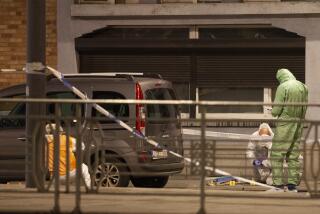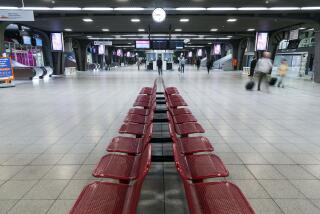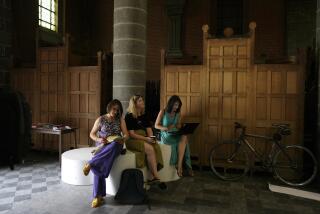Looking to 1992 : Brussels: A Capital Case of Euro-Itis
- Share via
BRUSSELS — On the train coming into Brussels, a pleasant tape-recorded voice welcomes passengers to the “Eurocapital.”
Bureaucrats here are Eurocrats. But there are also Euro-consultants, Euro-hair-stylists, Euro-schools and even a Euro-piano store. One shop not far from the European Commission headquarters sells Euro-gadgets.
“We have 120 different items,” boasted Euro-Tempo Boutique owner Nicole du Jacquiere, “including ties, umbrellas, bath towels, badges, key rings and leather goods. Our best sellers are the jogging outfits with the European colors (blue and gold) and emblems (a circle of 12 stars).”
A Superstate in 4 Years
The 12 members of the European Community--France, West Germany, Italy, Britain, Spain, Portugal, Belgium, Greece, Ireland, the Netherlands, Luxembourg and Denmark--have pledged to open their common borders and form a potentially powerful superstate of 300 million people in four years.
As the deadline of Dec. 31, 1992, for this new Europe approaches, the city of Brussels has come down with a capital case of Euro-itis. On one level, at least, the boosterism is well-founded. If the 12 member states realize their dream to become the “United States of Europe,” one of the main beneficiaries will be this soot-gray city of 1 million in the historic battleground of Europe, not far from Waterloo and Flanders Field.
As headquarters of the European Commission, home for most of the 12,000 commission bureaucrats and principal meeting place for various European councils and committees, Brussels seems destined to be the Washington, D.C., of this increasingly important federation of European states.
Parliament Sessions Here
The city was given another boost recently when the European Parliament, a body of elected representatives from the member states that is steadily gaining power under the 1992 format, voted to hold some of its sessions here instead of in Strasbourg, France, where the main Parliament building is located.
The motion by a British representative called for only “supplementary sessions” to be held in Brussels. However, many observers, including outraged French delegates, interpreted the vote as the first step in the eventual relocation of the Parliament to the Belgian city.
“Within 10 years, 80% of national economic and perhaps social decisions will be taken in Brussels,” European Commission President Jacques Delors predicted recently.
But the heady role cast for this city by the choreographers of the new Europe also has produced a healthy amount of skepticism among the Bruxellois--the native inhabitants of this odd, French-speaking city, who often think of themselves as stateless orphans in their own country--and among the various international representatives who live and work here.
Euro-talk is cheap, they say, but can this frumpish, conservative trading town rise above its limitations to shine as a world capital? Can a town where the most famous monument is a statue of a little boy urinating in a fountain--the manneken-pis --emulate the triumphant grandeur of Paris and London and Rome?
Can a place where hostilities between French- and Flemish-speaking populations have often erupted into violence and where huge North African and Turkish minorities live in poverty become the standard of an ethnically integrated Europe?
Can a political hodgepodge with 19 police chiefs and a debt of more than $1 billion lead the way to a new European prosperity?
‘A Soulless City’
“The only way it could possibly work is if it could be sold off to the 12 nations,” said Eric Rajendra, an American economist who acts as a corporate adviser on European questions in Paris and Brussels. “Otherwise, it will always be a soulless city with potholes and lousy city services.”
It could work, countered sociologist Rene Schoonbrodt, leader of the activist Urban Research and Action Workshop here, “if we could move the site of the capital outside the center of the city and create there a European quarter that reflected European cultural values.”
“As it is,” Schoonbrodt said, “we have big problems trying to welcome any expansion in the European Community. This is a small city of little houses where life is very fragile and threatened by the big office buildings and the thousands of functionaries. There are already days in Brussels when there is not a single place to hold a meeting because all the meeting places are booked. It’s scary.”
According to Schoonbrodt and other urban scholars here, the city is only now recovering from urban renewal projects begun here just before the 1958 World’s Fair, when a phenomenal network of freeways was carved through the city and surrounding countryside. By the time American astronauts got to the moon in 1969, only two man-made objects were visible to them from the lunar surface: the Great Wall of China and the brightly lit Belgian highway system.
More development followed in the 1960s after the European Commission installed its headquarters here and the North Atlantic Treaty Organization, ordered out of France by Charles de Gaulle, moved here in 1967.
‘Worse than Houston’
The result was massive overbuilding of modern office space, some of its cheek by jowl with medieval churches, and the destruction of entire neighborhoods. “It was a city without a plan--worse than Houston, Texas,” Schoonbrodt said.
Pockets of the original culture remained, however. Most of the city’s major tourist sites were left intact, including the ornate 15th-Century central square, the royal palace, the manneken-pis --which residents occasionally dress up in costumes ranging from a scuba diving suit to an American Army sergeant’s uniform--and the huge 19th-Century Hall of Justice, a bizarre combination of Roman and Egyptian architecture.
Longtime residents say the city’s virtues can be found in the small quirks of daily life such as its colorful local dialects; its rich, abundant food (“French food with German quantity,” purred one plump American diplomat based here), and its marvelous beers, some of which are brewed by Trappist monks.
But in his classic novel, “Heart of Darkness,” author Joseph Conrad described Brussels as a “sepulchral” city, gray and melancholy like the grave.
Also on the down side, city finances are a shambles. Metropolitan Brussels is divided into 19 political units called communes. The central commune of Brussels proper has a population of 140,000 residents and a deficit of nearly $1 billion.
French-Speaking Town
Also, because Brussels is a French-speaking town in a Flemish-speaking area of Belgium, it is unloved, and therefore mostly unfunded, by the rest of the country.
“Brussels is a city that hardly knows what it is,” said John Palmer, a British journalist and author who has lived many years in the Belgian capital. “It is an island of Francophonism because its Flemish feudal leaders spoke French. But its original inhabitants were mostly Flemish peasants who are still mistrusted by the French-speaking Walloon population of the south. Meanwhile, they are considered Uncle Toms by the Flemish speakers of the north.”
Although the city’s subway system is among the best in Europe, the rest of city services suffer. Municipal emergency and police services are overtaxed because nearly one-fourth of the city population is composed of illegal immigrants, mostly from North Africa and Turkey, who live in areas of high crime and high unemployment.
Native Bruxellois refer derisively to the ghettos as “Little Marrakesh” and “Little Istanbul.” Meanwhile, many Arab immigrants say they dream of someday returning to North Africa, where they can be free from the prejudices and intolerance of life here. Indeed, the bitterness here may be more intense than in the industrial cities of France.
Whether these unwanted, unhappy aspects of Brussels detract from the image of one of the world’s great new capitals remains to be seen.
Independent District
Belgian officials are hoping that a vote in the Brussels area June 18 will solve many of the capital’s problems. Prime Minister Wilfried Martens, as part of his reforms aimed at solving Belgium’s chronic language wars, has introduced a federal plan for his country, in which Brussels will become an independent district ruled by a council formed from the 19 communes.
“It will put the whole metropolitan area under one authority,” said Anne-Marie Lizin, a Belgian Cabinet minister who has been designated minister for 1992 under Martens. “We think it will solve our biggest problems.” The Belgian government, meanwhile, has pledged to pay nearly all of the Brussels debt.
The biggest advantage of Brussels and Belgium, Lizin said, is that the people have never been very patriotic. Historically, Belgium is a young and artificially created independent state that came into existance in the mid-19th Century.
“It is clear it is easier for us to be a citizen of the new country of Europe than it is for a Frenchman, for example,” Lizin said. “We have little or no sense of nationalism, and the constant fighting between the Flemish and the Walloons has actually helped us in this regard.”
In fact, a surprising number of Bruxellois think of themselves as stateless beings, eagerly awaiting the arrival of their new country: Europe.
‘A Great Crossroads’
Said Alain de Clerck, the 46-year-old owner of a sporting goods store in Brussels:
“I think of myself as European, never Belgian. To be Bruxellois means to live in a city in the center of Europe that is a great crossroads. It is to belong to three or four cultures at the same time. One part of my family is Flemish, another part Walloon and another part French. As a result, I don’t have much nationalistic sentiment.”
To demonstrate their new nationality, these Europeople have taken to flying the blue-and-gold European flag from their businesses.
An equally ubiquitous symbol of the new order seems to be the bumper stickers from Nicole du Jacquiere’s boutique, judging from the cars parked around the European Commission headquarters. Each car owner, the stylish blue-and-gold stickers proudly announce, is a “Citizen of Europe.”
More to Read
Sign up for Essential California
The most important California stories and recommendations in your inbox every morning.
You may occasionally receive promotional content from the Los Angeles Times.













